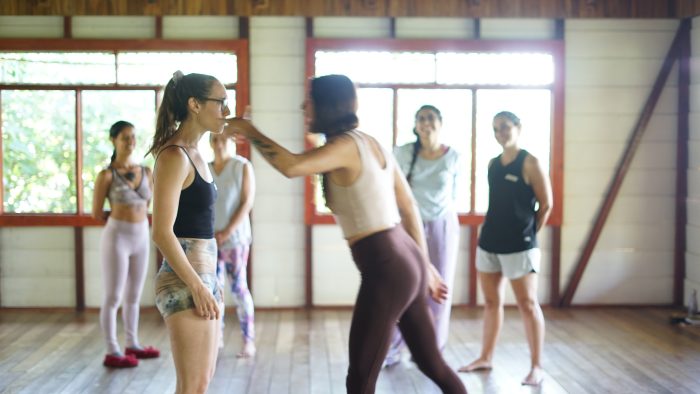The Real Reason We All Need (Empowerment) Self-Defense—on Valentine’s Day, & Every Day
This Valentine’s Day, consider celebrating love and relationships in the most romantic way possible: with boundaries! Empowerment self-defense training doesn’t just teach people how to say “no” to coercive, manipulative, or explicitly violent attacks. It also facilitates an intensely personal, radical development of self-awareness and self-confidence, which can make all of our relationships stronger, safer, and healthier. And what’s more romantic than that?
This Valentine’s Day, boundaries are in, and coercive relationships are out.
~
“Like, right now?”
“Yeah!” We all cheered as the young woman whipped out her phone mid-workshop.
The circle of women helped her to draft the message and put an end to the (perhaps unintentional, but nonetheless disruptive) digital harassment:
“You have been messaging me and calling me repeatedly. I am not interested in continuing to communicate. Stop calling me.”
She hit send, and the group congratulated her with wide smiles and applause. Her shoulders dropped, and her face relaxed in visible relief. So often, we don’t realize we are holding up our guard until we take the necessary steps to soften it.
We had been practicing the “magic formula,” a foundational assertive communication practice that I teach in almost all of my self-defense workshops and courses, when this participant brought up a real-life example. A man she had met briefly in a café and to whom she had reluctantly given her phone number had been texting and calling her for weeks. He was not disrespectful, nor did she feel he was dangerous. Nonetheless, his behavior was bothering her, causing unnecessary stress, and disrupting her days. The group encouraged her to apply the magic formula, immediately, and she did.
In a world where—across cultural, generational, and economic lines—women are socialized to ignore rather than address many forms of violence, from “well-intentioned” harassment to cyclic abuse or physical assault, visibilizing that violence and verbalizing our boundaries is a simple yet radical act.
~
Empowerment Self-Defense (ESD) might be the life practice you didn’t know you were missing to deepen your relationships this Valentine’s Day… and every day.
As a credentialed Empowerment Self-Defense (ESD) instructor and the founder of Mujeres Fuertes Autodefensa (Women Empowered Self-Defense), a Costa Rica-based social enterprise, I advocate for self-defense as a path to greater joy, connection, and pleasure. I believe that we cannot say a true “yes” to connection or intimacy without effective tools to say “no” to violence in all forms.
ESD is an evidenced-based, trauma-informed violence prevention methodology developed by female martial artists (and refined over several decades) to address the spectrum of violence faced by women, children, and other vulnerable populations. It differs from martial arts or “traditional” self-defense training in that it addresses the social context of violence, and therefore of self-defense and prevention, emphasizing verbal, emotional, and psychological strategies for personal safety and as much as, if not more than, physical skills.
Self-defense (centered on empowerment) is a daily practice. We all have a right to feel safe in the world, and we have a right to defend that safety when it is threatened. In spaces like the home, workplace, or intimate relationships where safety is often (wrongly) assumed, it is especially important to make use of assertive communication strategies to put our autonomy, well-being, and safety first.
Upwards of 90 percent of gender-based violence around the world and across demographics is perpetrated by someone known to the victim. Fifty percent of those perpetrators are the women’s current or former intimate partners. One in three women have experienced some form of sexual violence. Even if you think those numbers don’t apply to you, you can still benefit from (empowerment) self-defense training, because everyone can.
Empowerment Self-Defense, as I and my colleagues teach it, doesn’t just teach people how to say “no” to coercive, manipulative, or explicitly violent attacks. It also facilitates an intensely personal, radical development of self-awareness and self-confidence, which can make all of our relationships stronger, safer, and healthier.
We can define violence and self-defense along a broad spectrum. An attack by a stranger in the street or on the beach is violence. Emotional abuse is violence. Online harassment is violence. Cutting remarks, manipulative communication tactics, and coercion can also fit into that spectrum.
Generally, we don’t learn basic skills for defending ourselves, and violence prevention education is notably absent from most school and home curricula. ESD provides choices and practical strategies—both verbal and physical—for dealing with risk, danger, or simple discomfort in ways that support safety and agency.
At its best, I think it can also improve our day-to-day interactions with family, friends, and partners by helping us dial into our needs, desires, and boundaries, hone our intuition, and speak from it with confidence and power.
In ESD, we work extensively with “assertive communication” strategies to train boundary setting and de-escalation as critical skills for interrupting or defending against violence. For instance, my personal favorite, the Magic Formula referenced above, consists of three simple steps:
We first name the behavior (e.g. “You are raising your voice.” “You are making comments about my body.” “You’re touching me without my permission.” “You are calling me repeatedly.”) without questions or qualifications. Questions invite response, denial, or negotiation. In a dangerous or uncomfortable situation, we don’t want to start a conversation or argue over the facts; we just want to make the necessary changes to feel safe.
Next, if we wish, we state how we feel about the behavior (e.g. “I don’t like that.” “That is hurtful.” “I feel uncomfortable.” “I’m not interested.”) This step is optional, but a helpful addition for communication with people close to us who, hopefully, do care about our feelings and safety.
After naming the behavior and sharing how it makes us feel, we demand the change we wish to see (e.g. “Please lower your voice.” “Do not make comments like that again.” “Take your hand off me.” “Stop calling me.”) without feeling obliged to ask nicely or say please if we don’t wish.
This technique is an excellent choice for several reasons. First, it leaves no room for doubt; we both know what’s going on here, and we’re not going to argue over that. Second, it alerts any bystanders to the situation. Finally, it clearly states a boundary: “You’re doing this. I don’t want you to. Stop.” If the behavior persists, we then know a person does not respect our boundaries or care about our needs (or they’re not paying attention).
What we do with that information is up to us.
If these strategies sound like they could level up your personal growth and improve your relationships, romantic or otherwise, I invite you to look for empowerment self-defense offerings in your town or state.
~
Please consider Boosting our authors’ articles in their first week to help them win Elephant’s Ecosystem so they can get paid and write more.
 Share on bsky
Share on bsky


Read 2 comments and reply